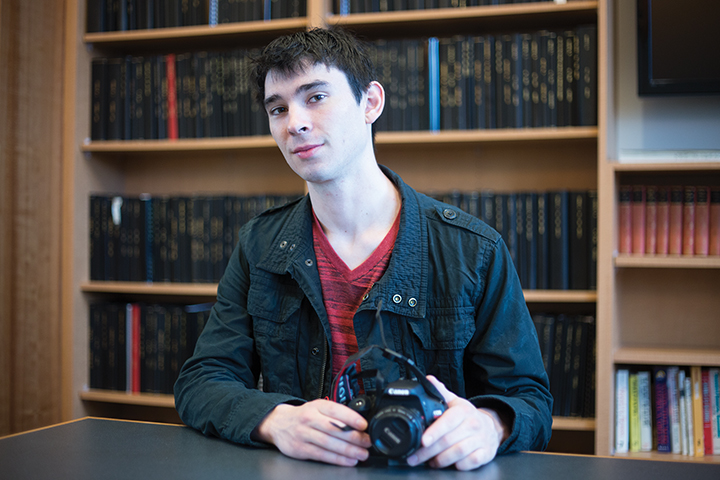
The sophomore poses for a portrait in Knight Hall. Keefe was recently honored at the Tribeca Film Festival.
Two university students were honored Friday at the Tribeca Film Festival for their video portraits of young medical scientists in labs funded by the National Institutes of Health.
Freshman Aaron Solomon and sophomore Kai Keefe were two of the four recipients of $1,500 prizes awarded by start-up website LabTV, which aims to inspire young people to enter medical research through videos. Solomon’s and Keefe’s video entries, which were chosen from about 200 student entries nationwide, garnered the Gold Award — the company’s highest honor.
“Any major film festival is an honor, but Tribeca is especially unique,” said David Hoffman, a preliminary judge and LabTV’s executive producer. “Tribeca is interested in disruptive innovation — it doesn’t matter how long it is, what matters is it’s innovative and disrupting in a good way, making society better in a good way.”
In late winter, Solomon and Keefe learned about the opportunity to film for LabTV through this university, without realizing the contest and prize money at stake, they said.
“It wasn’t something I was thinking about at all, but it was cool that it happened,” said Keefe, an environmental science and policy and journalism major. “[When] they announced it, it was a while ago that I had submitted the film, so it was a very pleasant surprise.”
LabTV assigned them to different labs at this university and then allowed them to choose their subject. They were tasked with capturing the individual’s research, daily work, personal life and motivation for the particular research.
Keefe profiled Rachel Lee, a doctoral candidate who compares cancerous and noncancerous cells in a biodynamics lab. Solomon focused on Di Wu in the Ken Cao Lab, and her research to understand molecular mechanisms of progeria, an early aging disease that lowers the average life expectancy of those affected to 13 years.
“When I initially signed up, I had no clue there were any awards, so I had no idea that was coming,” said Solomon, a cell biology and genetics and computer science major. “But it did, and I was very excited to be honored and mentioned at Tribeca.”
Hoffman said LabTV judges chose the videos that were most likely to influence the viewer to become a medical scientist in a lab. They wanted the videos to leave an impact on viewers, he said.
“Our goal is to find hundreds of thousands of young people, particularly women and minorities, to join the ranks of medical scientists,” Hoffman said.
Both Solomon and Keefe have been filming since high school. Keefe is mainly interested in the documentary side, though he still makes fictional films with the Maryland Filmmaker’s Club as a co-productions manager.
The club also freelances promotional work, Keefe said, and made a commercial for Mazda last semester. He hopes to get into the video industry in the future.
Solomon developed his interest when he went to video camp as a 13-year-old. He later began working for a public access TV station in Greenbelt, where he has been employed for more than five years. Because his studies at this university focus on the sciences, he said he thought the LabTV project “flowed together really well in my mind.”
As a pre-med student, Solomon said he doubts he will pursue videography as a career. But it’s something he always enjoys, he added, and he said he would consider making documentaries of his research.
Even if Solomon and Keefe choose not to continue with film and video in the future, the skills are invaluable, Hoffman said.
“More and more, young people are using YouTube to find out whatever they want to find out — that’s the power of video,” Hoffman said. “This is the way for a lot of people. Whether or not these people become filmmakers, they are going to be ahead of the game in understanding how and why it works.”



